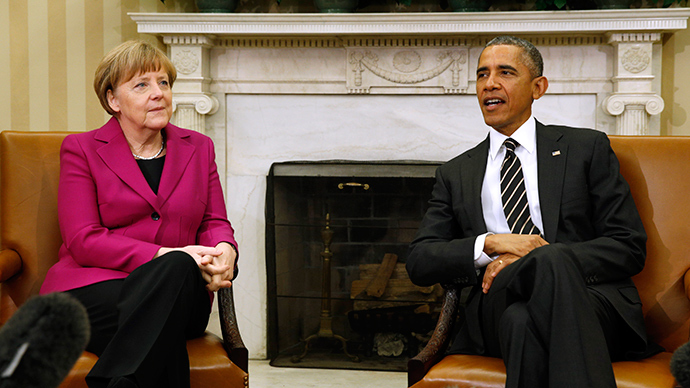‘US, EU unity on Ukraine crisis is cracking & fracturing’

A split between the US and EU over the prospect of sending arms to Kiev, if not just public posturing, would mean Europe is finally getting a policy of its own – something Washington never wanted to happen, political expert Nebojsa Malic told RT.
READ MORE: Obama, Merkel display ‘tactical disagreements’ over Ukraine
RT:Do you think
the meeting between Merkel and Obama was
fruitful?
Nebojsa Malic: Just a message that the US is considering to send weapons is going to be encouraging the regime in Kiev not to engage in any sort of diplomacy and continue to pursue military means to resolving this crisis.
But the fact that there is dissent from Europe is meaningful and significant – if it is, in fact, real descent and not just public posturing. I think the Europeans are feeling the impact of the sanctions because this war of words and deeds, in which Washington is targeting Moscow via Kiev, is really destroying the European economy more than anything else.
And so the Europeans are trying desperately to get some way out of this crisis, and would also give their project a much needed legitimacy boost after the events in Greece. Whether Washington will allow them to do that remains to be seen.
RT:Merkel reiterated her view that only diplomacy will work – will Washington ever go along with that?
NM: Well, considering that the diplomatic solution – that what the Germans, French, and Poles achieved on February 21 last year lasted less than a day before Washington-sponsored radicals violently overthrew the government and basically scuttled it – I don't think Washington is going to allow it. I think too many people in this town are invested in the project of hostilities towards Russia and generating some sort of militantly Banderous Ukraine, that they will not be willing to just let it go.
RT:Both leaders repeated many times that the alliance was as firm as ever – why did they feel the need to labor the point?
NM: Well, it is one of those rules of politics: when you have to say something is, it is a sure sign that it is not. The more people talk about unity, the more you can conclude that there is a lack of unity, in fact. So the pronouncement by Secretary Kerry and Obama, “We're unified, everything is fine, don't pay any attention of what is going on,” is more a sign of panic and fear that the unity is actually cracking and fracturing, and the Germans especially – and the Europeans in general – are trying to go their own way.
#Obama, #Merkel display ‘tactical disagreements’ over #Ukrainehttp://t.co/HIVlsXYNYZpic.twitter.com/YzChnjF7cd
— RT (@RT_com) February 10, 2015
I think there is a desperate need...to conjure reality into being through words, and it obviously keeps not working, but it does not stop them from trying.
RT:Very few European countries support the idea of arming Kiev, something the US is considering in earnest...and only a few European nations joined Washington's anti-ISIS coalition. Is the White House losing its hold on Europe?
NM: Europe's relationship with Washington is very complex. The EU by itself has no policy of its own, and this is the way Washington has wanted it from the very beginning. So you can play certain countries against each other. You know, people that have interests in their own neighborhoods tend to prioritize those over some sort of joint strategy.
I think one of the basic policy goals of Washington in Europe is to prevent any coherent joint European policy from ever arising. This is far more important than Russia or China or ISIS, or anything. Because if Europe gets its act together and starts acting independently, then all of a sudden Washington is lacking the second pole of its axis that is ruling the world, and it can’t project power. So again, it is useful to keep in mind that part and parcel of Washington’s action is preventing any sort of consensus within Europe itself.
MORE:
The statements, views and opinions expressed in this column are solely those of the author and do not necessarily represent those of RT.












